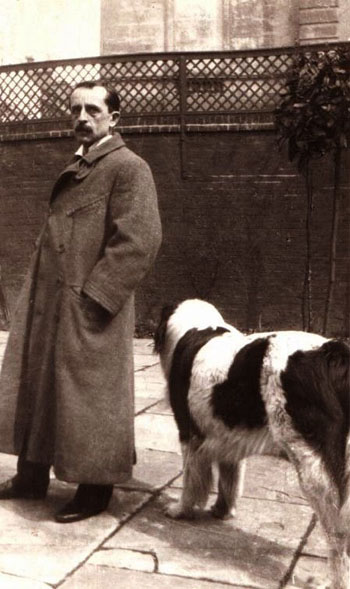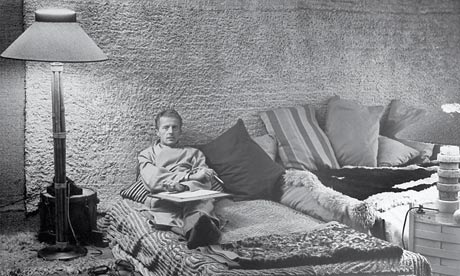In today’s Wall Street Journal I review a rare and important regional revival, the Peterborough Players’ production of J.M. Barrie’s The Admirable Crichton. Here’s an excerpt.
* * *
 When the spotlight goes out on theatrical fame, it leaves behind impenetrable darkness. A century ago J.M. Barrie was as well known as George Bernard Shaw or Henrik Ibsen. Today “Peter Pan” is the only one of his many plays that continues to be performed in this country, and most Americans think that Jerome Robbins wrote it. Were it not for Mr. Robbins’ much-loved musical-comedy version of the 1904 stage fantasy about a plucky boy who refused to grow up, Barrie would be nothing more than a footnote to the history of Vicwardian theater. Might he be due for a second look? Gus Kaikkonen, the artistic director of the Peterborough Players, thinks so, for his company is currently performing “The Admirable Crichton,” a once-famous Barrie comedy that disappeared from the American stage decades ago–and judging by Mr. Kaikkonen’s brilliantly effective production, it’s a not-so-minor masterpiece…
When the spotlight goes out on theatrical fame, it leaves behind impenetrable darkness. A century ago J.M. Barrie was as well known as George Bernard Shaw or Henrik Ibsen. Today “Peter Pan” is the only one of his many plays that continues to be performed in this country, and most Americans think that Jerome Robbins wrote it. Were it not for Mr. Robbins’ much-loved musical-comedy version of the 1904 stage fantasy about a plucky boy who refused to grow up, Barrie would be nothing more than a footnote to the history of Vicwardian theater. Might he be due for a second look? Gus Kaikkonen, the artistic director of the Peterborough Players, thinks so, for his company is currently performing “The Admirable Crichton,” a once-famous Barrie comedy that disappeared from the American stage decades ago–and judging by Mr. Kaikkonen’s brilliantly effective production, it’s a not-so-minor masterpiece…
First performed in London in 1902, “The Admirable Crichton” is the story of an upper-class London family whose eccentric but well-meaning patriarch, Lord Henry Lasenby, the Earl of Loam (Michael Page), subscribes to the Rousseauvian notion that “our divisions into classes are artificial” and that “if we were to return to nature, which is the aspiration of my life, all would be equal.” Not so Crichton (Tom Frey), his omnicompetent, ultra-conservative butler, who believes no less devoutly that the English class system is “the natural outcome of a civilized society. There must always be a master and servants in all civilized communities…for it is natural, and whatever is natural is right.”
Both men’s convictions are put to the test when the Lasenbys are shipwrecked on a deserted island. No sooner do they prove preposterously incapable of fending for themselves than Crichton, who has hitherto treated his employers with impeccable deference, assumes his natural status as a leader of men and becomes the island’s benevolent but iron-willed dictator….
All this is, of course, the stuff of sky-high comedy, and Barrie rings the comic changes on his promising theme with satisfying skill. The first half of “The Admirable Crichton,” in fact, is as witty and fresh as anything that Oscar Wilde ever wrote–and the second half, in which the Lasenbys are rescued by a passing ship and Crichton returns to his status as a servant, is even better. What started out as a fluffy backstairs farce effortlessly changes key and becomes a dead-serious comedy about how the English class system stunts the emotions of all who subscribe to its soul-deadening tenets….
I’ve praised Mr. Kaikkonen often in this space, both for his Peterborough Players productions and for his work with New York’s Mint Theater. His uncluttered, untricky stagings never fail to give value for money, and this one is no exception. It deserves to be remounted in Manhattan…
* * *
Read the whole thing here.
Archives for August 3, 2012
TT: Making a little music go a long, long way
In my “Sightings” column for today’s Wall Street Journal I pay tribute to two famous pieces of incidental music. Here’s an excerpt.
* * *
“A melody is heard, played upon a flute. It is small and fine, telling of grass and trees and the horizon. The curtain rises.” Those are the first lines of Arthur Miller’s “Death of a Salesman.” Have you ever read a more evocative cue for music? You wouldn’t think that Mr. Miller’s notoriously tinny ear was that good–and you’d be right. He penned that sentence after he heard the music that Alex North composed for the play’s original Broadway production, and was so struck by what he heard that he wrote it into the script….
Nowadays it’s unusual for a straight play, whether on Broadway or elsewhere, to make use of incidental music for any purpose other than signaling to noisy audiences that the curtain is about to go up. But well into the Fifties and after, American playwrights and the composers who collaborated with them frequently employed music in much the same way that it is used in movies. As the film composer Bernard Herrmann wrote, “Music on the screen can seek out and intensify the inner thoughts of the characters….It often lifts mere dialogue into the realm of poetry.” It can also do that on the stage–as it does in “Death of a Salesman,” whose limpid, graceful score makes more out of Mr. Miller’s words than he put there in the first place.
 Music is even more central to “The Glass Menagerie,” Tennessee Williams’ first stage success, which was scored by Paul Bowles in three days for a flat fee of $50. I doubt that so small a sum has ever been spent to better effect by a producer. A minute after the curtain goes up, Tom Wingfield, the narrator, speaks these words: “The play is memory. Being a memory play, it is dimly lighted, it is sentimental, it is not realistic. In memory everything seems to happen to music.” Underneath his speech you hear a distant, delicate musical phrase that sounds as fragile as spun sugar. Variations on this phrase are heard at key moments throughout the play, usually in connection with the collection of glass animals owned by Laura, Tom’s shy sister, who fears life and lives in a world of dreams….
Music is even more central to “The Glass Menagerie,” Tennessee Williams’ first stage success, which was scored by Paul Bowles in three days for a flat fee of $50. I doubt that so small a sum has ever been spent to better effect by a producer. A minute after the curtain goes up, Tom Wingfield, the narrator, speaks these words: “The play is memory. Being a memory play, it is dimly lighted, it is sentimental, it is not realistic. In memory everything seems to happen to music.” Underneath his speech you hear a distant, delicate musical phrase that sounds as fragile as spun sugar. Variations on this phrase are heard at key moments throughout the play, usually in connection with the collection of glass animals owned by Laura, Tom’s shy sister, who fears life and lives in a world of dreams….
Mr. Bowles’ score is still heard from time to time in modern productions of the play, while Mike Nichols made memorable use of Mr. North’s “Death of a Salesman” music in his recent Broadway revival. But if you want to acquire the best possible understanding of how these scores work, you need to hear them up close–and now you can. Both have been released as mp3 “albums” that can be downloaded from Amazon, iTunes and other web-based music dealers. The “Death of a Salesman” score was recorded by the four musicians who played it on Broadway in 1949, while Mr. Bowles’ music for “The Glass Menagerie” was used in a studio recording that was made for Caedmon in 1964 by Montgomery Clift, Julie Harris, Jessica Tandy and David Wayne….
* * *
Read the whole thing here.
TT: Almanac
“We are rarely proud when we are alone.”
Voltaire, Philosophical Dictionary
